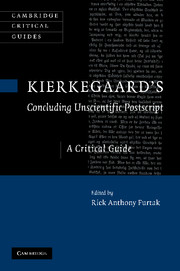Book contents
- Frontmatter
- Contents
- List of contributors
- Acknowledgments
- List of abbreviations
- Introduction
- 1 The “Socratic secret”: the postscript to the Philosophical Crumbs
- 2 Kierkegaard's Socratic pseudonym: A profile of Johannes Climacus
- 3 Johannes Climacus' revocation
- 4 From the garden of the dead: Climacus on interpersonal inwardness
- 5 The Kierkegaardian ideal of “essential knowing” and the scandal of modern philosophy
- 6 Lessing and Socrates in Kierkegaard's Postscript
- 7 Climacus on subjectivity and the system
- 8 Humor and irony in the Postscript
- 9 Climacus on the task of becoming a Christian
- 10 The epistemology of the Postscript
- 11 Faith and reason in Kierkegaard's Concluding Unscientific Postscript
- 12 Making Christianity difficult: The “existentialist theology” of Kierkegaard's Postscript
- Bibliography
- Index
- References
8 - Humor and irony in the Postscript
Published online by Cambridge University Press: 04 August 2010
- Frontmatter
- Contents
- List of contributors
- Acknowledgments
- List of abbreviations
- Introduction
- 1 The “Socratic secret”: the postscript to the Philosophical Crumbs
- 2 Kierkegaard's Socratic pseudonym: A profile of Johannes Climacus
- 3 Johannes Climacus' revocation
- 4 From the garden of the dead: Climacus on interpersonal inwardness
- 5 The Kierkegaardian ideal of “essential knowing” and the scandal of modern philosophy
- 6 Lessing and Socrates in Kierkegaard's Postscript
- 7 Climacus on subjectivity and the system
- 8 Humor and irony in the Postscript
- 9 Climacus on the task of becoming a Christian
- 10 The epistemology of the Postscript
- 11 Faith and reason in Kierkegaard's Concluding Unscientific Postscript
- 12 Making Christianity difficult: The “existentialist theology” of Kierkegaard's Postscript
- Bibliography
- Index
- References
Summary
Early in my teaching career, two students independently came up to me to thank me for having set the essay on “Crop Rotation” from Either/Or as essential reading for that week. This, they said, was the first piece of philosophical writing they had been set in three years of university study that had made them laugh out loud.
Kierkegaard can be funny. This assertion will strike some as surprising, others as a statement of the obvious. To anyone familiar with the witty, amusing prose of which he is capable, Kierkegaard's popular reputation as the “melancholy Dane” has always seemed somewhat ironic. In Kierkegaard we read of the Paraguayan tribe so apathetic that visiting Jesuit missionaries found it necessary to ring a bell at midnight to remind the men to attend to their marital duties; of a literary culture so willing to accept second-hand opinions that a book could be published, reviewed, and cause a sensation without having actually been written; and of authors in a small country commenting on each other's books as akin to two fat princes who take their exercise by walking around one another. Perhaps my favorite is the story of the barefoot peasant who comes to town and makes so much money that he can afford to buy new shoes and stockings and still have enough left to get drunk. On the way home, inebriated, he lies down in the middle of the road and falls asleep.
Keywords
- Type
- Chapter
- Information
- Kierkegaard's 'Concluding Unscientific Postscript'A Critical Guide, pp. 149 - 169Publisher: Cambridge University PressPrint publication year: 2010



